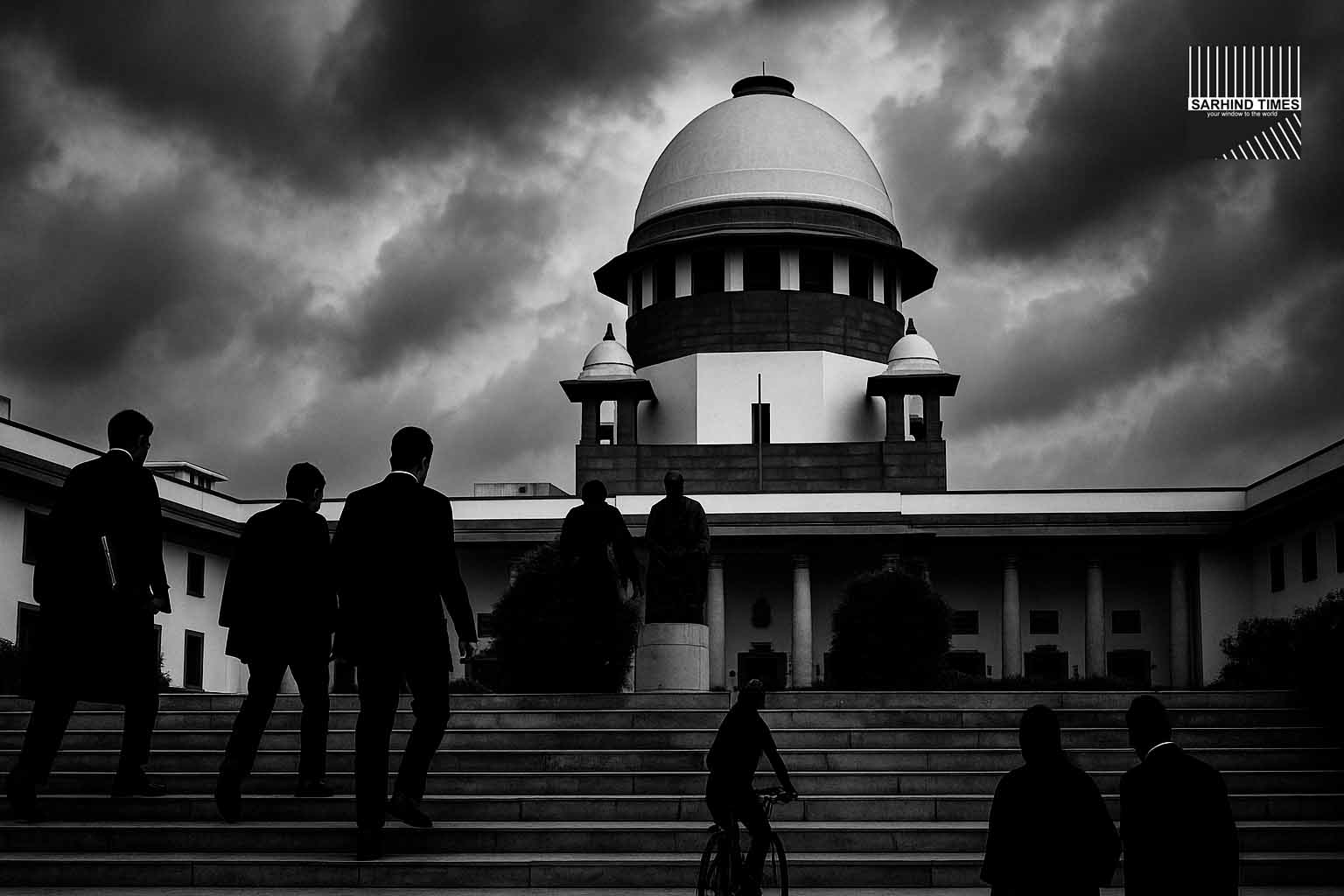By SarhindTimes Political & Legal Affairs Desk | New Delhi | Tuesday, October 21, 2025
In a major setback for the Aam Aadmi Party (AAP), the Supreme Court of India on Monday upheld the Delhi High Court’s order dismissing the disqualification appeal of party MLA Rajesh Sharma, who was removed from the Legislative Assembly earlier this year for holding an “office of profit.”
The apex court’s ruling reaffirms the Election Commission of India’s (ECI) 2024 recommendation that Sharma, a sitting MLA from Karawal Nagar, violated constitutional provisions by simultaneously serving as chairman of a government advisory board.
Delivering the judgment, a two-judge bench led by Justice Sanjiv Khanna and Justice Bela M. Trivedi observed that “public trust requires absolute separation between legislative duty and executive privilege.”
Background: The Office of Profit Debate
The controversy dates back to November 2023, when the Delhi Government appointed Rajesh Sharma as Chairman of the Delhi Urban Renewal Advisory Board, a post that carried remuneration, government-funded travel, and logistical privileges.
Following complaints from opposition legislators, the Election Commission began inquiries under Article 191(1)(a) of the Constitution, which disqualifies any MLA or MP who holds an office of profit under the government.
In February 2024, the ECI submitted its opinion to the President, concluding that Sharma’s appointment indeed constituted an “office of profit.” Acting on that advice, President Droupadi Murmu issued an order disqualifying him on March 15.
Sharma challenged the decision before the Delhi High Court, arguing that his position was “honorary and advisory”, but the court dismissed the plea in August 2024—a ruling now affirmed by the Supreme Court.
The Supreme Court’s Judgment
The Supreme Court bench upheld the constitutional principles laid down in earlier rulings, including Jaya Bachchan v. Union of India (2006) and Pradyut Bordoloi v. Swapan Roy (2001), both of which held that even non-salaried posts can attract disqualification if they confer executive benefits or influence.
The bench stated:
“It is immaterial whether the appointee draws a salary or acts voluntarily. The test lies in whether the office provides the holder with any tangible or intangible advantage from the government.”
The court found that Sharma’s board position allowed him access to government infrastructure, decision-making processes, and resources—thereby breaching the spirit of legislative independence.
The bench further observed:
“Public representatives must remain unentangled from administrative offices to ensure uncorrupted governance. The Constitution draws this line to prevent the misuse of executive patronage.”
Arguments by Both Sides
Senior Advocate Abhishek Manu Singhvi, appearing for Sharma, argued that the appointment was “purely consultative” and carried no remuneration. He stressed that “holding meetings or offering policy input” does not constitute an office of profit under settled law.
He added:
“The petitioner never drew salary, perks, or allowances. The title of chairman was symbolic, reflecting contribution to policy discussions.”
Representing the ECI, Solicitor General Tushar Mehta countered that material evidence—including official circulars and budget notes—proved the position carried financial and administrative privileges.
He said:
“The Constitution’s framers intended to bar any overlap between lawmaking and execution. An MLA cannot sit in a position that allows administrative discretion, however benign it may appear.”
Impact on AAP and Delhi Politics
The ruling further narrows AAP’s strength in the 70-member Delhi Assembly, already weakened by internal splits and ongoing corruption probes.
With Sharma’s seat vacated, the Election Commission is expected to announce a by-election within 45 days.
Political analysts see the verdict as a moral blow to the party’s clean-governance narrative.
Dr. S.K. Datta, political scientist at Delhi University, told Sarhind Times:
“The judgment reaffirms constitutional morality. For AAP, which rose on the plank of ethics and transparency, it’s a symbolic wound ahead of municipal elections.”
AAP’s Reaction
Chief Minister Arvind Kejriwal expressed disappointment but stopped short of criticizing the judiciary.
He told reporters:
“We respect the Supreme Court’s verdict, but we also believe Rajesh Sharma acted in public interest, not personal gain. We will continue to serve people with honesty.”
Meanwhile, party spokesperson Priyanka Kakkar accused the central government of “weaponizing institutions” to target opposition states.
“From ECI to ED, every agency seems to have one mission—to cripple elected state governments,” she said.
Opposition’s Counterattack
The Bharatiya Janata Party (BJP) wasted no time in seizing the political opportunity.
Delhi BJP president Virendra Sachdeva demanded that the Chief Minister himself “step down from moral responsibility” for appointing MLAs to such posts.
“This is not one case but part of a pattern—appointments to bypass checks and distribute power through backdoors,” Sachdeva alleged.
The Congress Party, too, issued a statement supporting the verdict, calling it a “victory of constitutional discipline.”
Legal Context: Understanding ‘Office of Profit’
The phrase “office of profit” has long tested constitutional interpretation.
According to Article 191(1)(a) and Article 102(1)(a), a legislator is disqualified if they hold any office that yields profit or advantage under the government, except offices specifically exempted by law.
In essence, the principle ensures that lawmakers remain independent of the executive.
The Parliament (Prevention of Disqualification) Act, 1959 provides exemptions—for example, membership in statutory commissions or committees that function independently.
However, advisory boards controlled directly by government departments, like the one chaired by Sharma, rarely qualify for such exemption.
Constitutional Benchmarks Cited
During the hearing, the court revisited several landmark judgments:
- Shibu Soren v. Dayanand Sahay (2001): Established that “profit” includes not only salary but also administrative leverage.
- Jaya Bachchan v. Union of India (2006): Clarified that “post-holding” itself, even without monetary gain, can influence executive decisions.
- Bihar PSC v. Suresh Prasad (2013): Reiterated that immunity applies only where Parliament explicitly exempts a position.
Citing these, Justice Trivedi said:
“Constitutional separation of powers is not academic—it’s a guardrail against political patronage.”
Political Repercussions
The verdict could trigger a review of nearly a dozen similar appointments made across Delhi’s departments since 2022, including advisory roles in education, transport, and health boards.
Sources in the Secretariat confirmed that the Law Department has been asked to compile a list of all non-exempted offices that MLAs currently hold.
Analysts believe this may deter governments from rewarding loyal legislators with quasi-administrative posts—a practice prevalent across states.
Election Commission’s Stand Vindicated
ECI officials privately welcomed the judgment, saying it vindicated the institution’s neutrality.
An official said on condition of anonymity:
“Our role is advisory, but our opinions carry weight when backed by evidence. This verdict reaffirms the sanctity of constitutional consultation under Article 192.”
The Commission is expected to issue a clarificatory circular to all state assemblies, reiterating norms on conflict of interest and office-of-profit guidelines.
Public Opinion and Media Reaction
Public reactions were divided.
Supporters of judicial independence lauded the verdict, calling it a “textbook example of checks and balances in action.”
However, AAP loyalists on social media criticized the ruling as “technical overreach.”
On X, the hashtag #OfficeOfProfit trended alongside #SupremeCourtVerdict, generating over 60,000 posts within hours.
Editorials in major dailies hailed the decision as a “restoration of constitutional discipline.”
Expert Commentary
Constitutional expert Prof. Faizan Mustafa told Sarhind Times:
“The ruling reinforces institutional clarity. Public office must never become a tool of personal or political leverage. Even well-intentioned advisory roles can compromise neutrality.”
He added that lawmakers should seek prior legal vetting before accepting quasi-executive positions to avoid inadvertent disqualification.
The Larger Message
Beyond Delhi, the verdict sends a strong signal across India’s federal landscape—where regional governments often appoint ruling-party legislators to boards, commissions, and missions that blur constitutional lines.
Legal observers predict an uptick in preemptive resignations from such posts in several states.
Justice Khanna’s oral remark captured the essence:
“The moment one foot stands in the legislature and the other in the executive, balance collapses. Democracy demands clear footprints.”
Conclusion: A Lesson in Boundaries
The Supreme Court’s affirmation is not just about one MLA or one post—it is a reminder that governance thrives on distance, not overlap.
For elected representatives, public service must remain untainted by privilege; for governments, loyalty cannot override legality.
The ‘office of profit’ clause—once considered archaic—has today reasserted its relevance in modern politics.
As India’s democracy matures, boundaries between governance and temptation must remain bright, visible, and non-negotiable.
#SupremeCourt #AAP #OfficeOfProfit #DelhiPolitics #Judiciary #Governance #ConstitutionalLaw #IndiaNews




+ There are no comments
Add yours